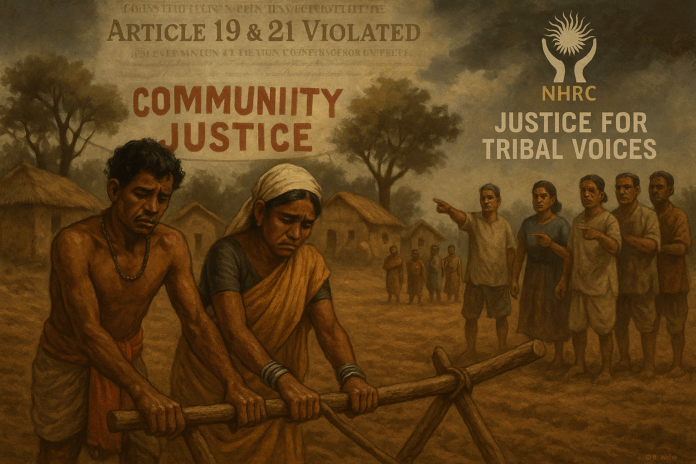Location: Rayagada district, Odisha
Incident: A shocking case of public humiliation of a tribal couple has sparked national outrage and legal action.
🧑🌾 What Happened?
In a remote village of Rayagada, a tribal couple was publicly shamed, humiliated, and forced to till farmland as a form of punishment. This so-called “penalty” was imposed by a local group claiming that the couple had violated traditional tribal customs.
They were paraded, made to do forced labor, and subjected to mental trauma—all in the name of community discipline. No legal authority sanctioned this action. It was a case of mob-imposed justice, violating both their dignity and human rights.
NHRC Takes Action
The National Human Rights Commission (NHRC) has taken suo motu cognizance (taken action on its own without a formal complaint) and registered a petition demanding:
-
✅ Independent investigation into the incident
-
✅ Legal action against the individuals who imposed the punishment
-
✅ Immediate relief and compensation to the victims
-
✅ Protection for the couple against further harm or social boycott
What Constitutional Rights Were Violated?
This incident is not just socially unacceptable it is legally unconstitutional.
🔸 Article 21 – Right to Life and Personal Liberty
Article 21 guarantees every citizen the right to live with dignity. Forcing someone into public humiliation or forced labor violates this right. Life is not just about survival it includes the right to live with honor, respect, and freedom from cruelty.
🔹 Example: In past landmark judgments, the Supreme Court has held that “right to life” includes protection from torture, degrading treatment, and forced labor (e.g., Bandhua Mukti Morcha vs. Union of India).
🔸 Article 19 – Freedom of Expression and Movement
The couple’s basic freedoms were curbed. They were not allowed to defend themselves, restricted in their movement, and subjected to community pressure without any due process.
🔹 Example: Any citizen has the right to move freely and live peacefully anywhere in India, and no community can illegally restrict or punish someone outside the bounds of law.
🔸 SC/ST (Prevention of Atrocities) Act
Since the victims are from a tribal community, this act comes into play. Humiliating a person based on their caste or tribal identity in public view is a serious offense, punishable by imprisonment.
Why This Matters
This is not just a village issue it reflects larger problems of:
-
Parallel “community justice” systems
-
Lack of awareness of rights in tribal areas
-
Weak implementation of protective laws
If such practices are ignored, they undermine democracy and constitutional values.
What Must Be Done?
-
Awareness of rights (especially in tribal and rural communities) is essential
-
Empowering citizens through tools like the Right to Information (RTI) can help track local governance and expose such injustices
-
Training local journalists and human rights defenders to identify and report violations
-
Ensuring timely action and follow-up by NHRC and local authorities
No one should suffer humiliation for who they are or how they choose to live.
The Constitution of India promises dignity, equality, and freedom to every individual including the most marginalized.
Let’s use this case as a reminder that social customs must never override constitutional rights, and justice must reach every corner of the nation — from metros to remote tribal villages.
💬 “Tribal rights are human rights. Humiliation has no place in democracy.”
— Bharat Aawaz





